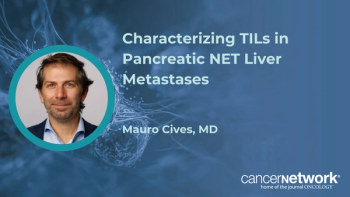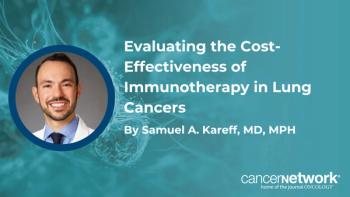
HER2+ Apocrine Carcinoma of the Breast Trends Towards Less Aggressive Phenotype, Favorable Outcomes
Patients with HER2-positive apocrine carcinoma of the breast are less likely to have an aggressive phenotype and are more likely to have favorable outcomes, even though the group has a lower rate of estrogen and progesterone receptor positivity.
Less aggressive phenotypes and favorable outcomes have been observed in HER2-positive apocrine carcinoma (APO) of the breast, even though this population is characterized as having lower rates of estrogen (ER) and progesterone receptor (PR)–positive disease, according to research published in Breast Cancer Research and Treatment.
HER2-positive APO was more common in patients 80 years or older (24.7%) compared with the HER2-positive no special type (NST) cohort (15.7%; P <.001). In the population of patients with steroid receptor (SR)–negative disease, those with APO had significantly lower histological grades compared with the NST cohort (P <.001). Additionally, breast cancer–related death was less notable in the APO group (3.9%) vs the NST group (7.8%; P = .019), especially in the subgroup of patients with SR-negative disease (4.2% vs 10.4%; P <.008); this was further reaffirmed by univariate analysis (P = .03).
“Our findings indicate that [patients with] HER2-positive APO do substantially better compared with HER2-positive NST carcinomas. This is mainly reflected in BCSS [breast cancer–specific survival] and was independent of ER and PR status. Our results are in line with a recently published SEER [Surveillance, Epidemiology, and End Results] cohort of triple-negative APO, which also revealed that these cancers had a better prognosis than [triple-negative breast cancer] NST. Several other independent studies confirmed a more favorable outcome for [patients with] triple-negative APO,” investigators wrote.
Investigators used the SEER database, which included data such as demographics, tumor characteristics, first treatment, treatment options, and follow up, to build a cohort of patients. Patients were selected based on histologically confirmed invasive HER2-positive APO who were diagnosed from 2010 to 2016. Patients were divided based on ER/PR and HER2 status. Those with in situ carcinomas and other certain types of HER2-positive invasive breast carcinomas were excluded.
Of 446,806 patients who were diagnosed with a breast malignancy from 2010 to 2016, 259 had HER2-positive APO. Within the same time period, 52,860 patients were diagnosed with HER2-positive invasive breast cancer NST. The median follow up was 31 months for the pooled cohort, 27 months for the APO cohort, and 31 months for the NST cohort.
Patients had an average age of 69.1 years in the APO cohort vs 65.3 years in the NST cohort (P <.001).
No notable differences were reported between the groups with regard to race, tumor stage, regional lymph node status, or presence of distant metastases. Additionally, treatment options such as surgery and chemotherapy were similar between the groups, although investigators reported that radiotherapy was more commonly used in the APO cohort vs the NST cohort (P = .05).
The APO group also had a higher estimated overall survival (OS) rate at 18 months and beyond compared with the NST group (HR, 1.26; 95% CI, 0.83-1.92), although the difference wasn’t statistically significant (P = .264). Despite this, apocrine morphology has a positive effect, with investigators reporting an unadjusted HR of 1.83 in the BCSS analysis; this translated to an 83% higher hazard of breast cancer–specific death in the NST cohort.
Findings from the multivariate Cox proportional hazards model analysis indicated that the APO cohort had both better OS (HR, 1.512; 95% CI, 0.9-2.32; P = .059) and significantly better BCSS (HR, 2.19; 95% CI, 1.13-4.21; P = .018) vs the NST cohort.
Reference
Skenderi F, Alahmad MAM, Tahirovic E, et al. HER2-positive apocrine carcinoma of the breast: a population-based analysis of treatment and outcome. Breast Can Res and Treat. Published online March 30, 2022. doi:10.1007/s10549-022-06578-4
Newsletter
Stay up to date on recent advances in the multidisciplinary approach to cancer.












































